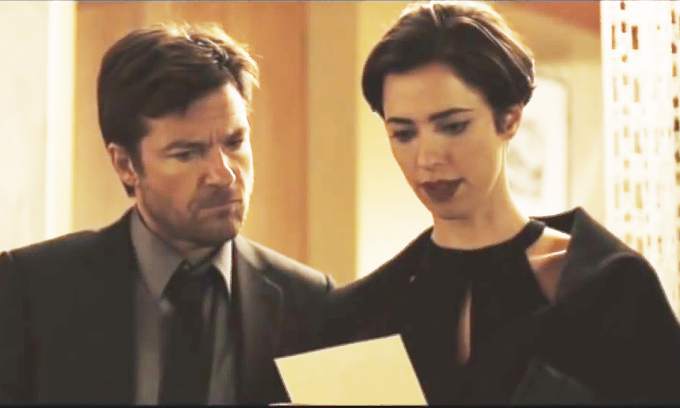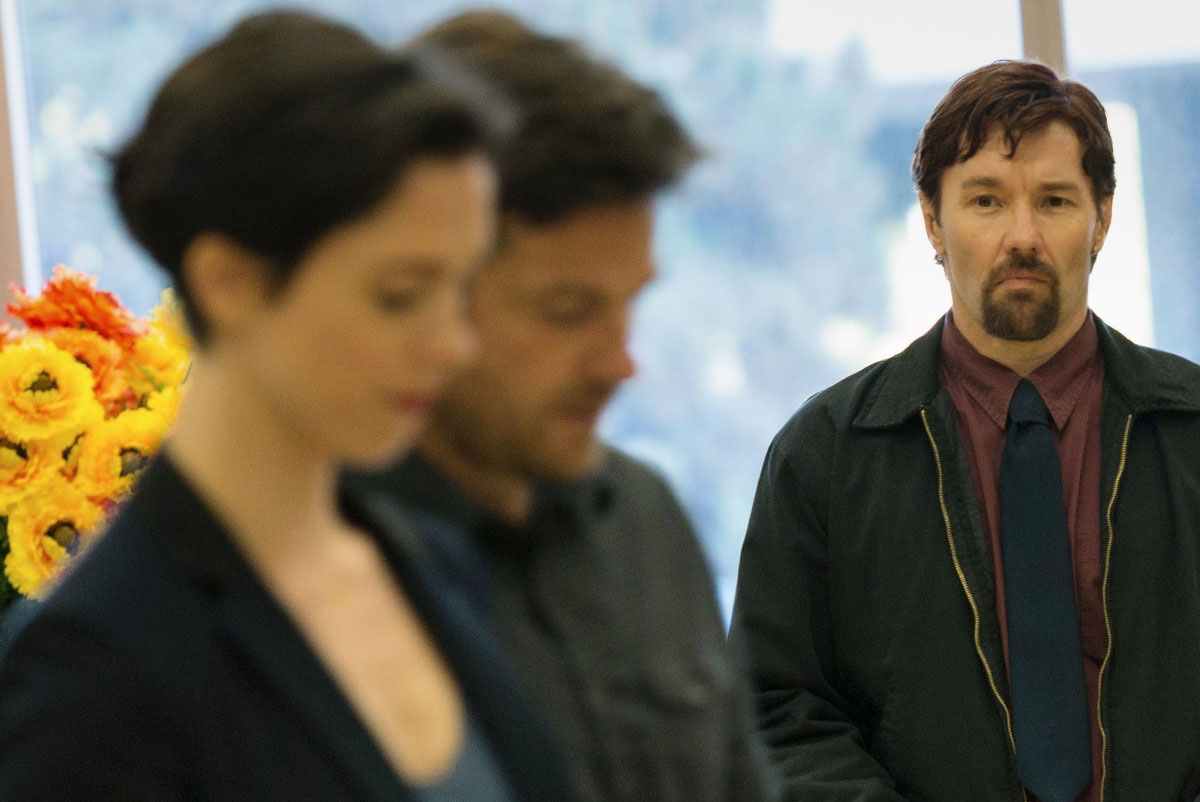Film review: the Gift
 I like psychological thrillers and I think this is a good one. The story revolves around three main characters. Firstly we see Simon (Jason Bateman) and his wife Robyn (Rebecca Hall) who move to California from Chicago because of Simon's new job (I wonder if the screenplay writer had just seen Pixar's Inside Out which starts the same way!). This happens to be Simon's home town and shortly after moving in he is recognized by an old school friend, the third protagonist, 'Gordo' played by Joel Edgerton, who also directed the film and wrote that screenplay! Gordo insists on swapping phone numbers even though Simon is clearly hesitant. Then, a few days later, Gordo turns up uninvited at their house a few days when only Robyn is at home. She feels obliged to invite him in for dinner. For the first part of the film the suspense is slowly set up and we feel that this is developing into a reasonable, but somewhat predictable, psychological thriller with a few shocking moments - for example, we could see that it was foolish for Robyn to ask Gordo into the house and to stay for dinner.
I like psychological thrillers and I think this is a good one. The story revolves around three main characters. Firstly we see Simon (Jason Bateman) and his wife Robyn (Rebecca Hall) who move to California from Chicago because of Simon's new job (I wonder if the screenplay writer had just seen Pixar's Inside Out which starts the same way!). This happens to be Simon's home town and shortly after moving in he is recognized by an old school friend, the third protagonist, 'Gordo' played by Joel Edgerton, who also directed the film and wrote that screenplay! Gordo insists on swapping phone numbers even though Simon is clearly hesitant. Then, a few days later, Gordo turns up uninvited at their house a few days when only Robyn is at home. She feels obliged to invite him in for dinner. For the first part of the film the suspense is slowly set up and we feel that this is developing into a reasonable, but somewhat predictable, psychological thriller with a few shocking moments - for example, we could see that it was foolish for Robyn to ask Gordo into the house and to stay for dinner.
However, the character development start to cast doubt on where we think the plot is going. We discover that each character is a mixture of good and bad. They are capable of being magnanimous and warm, but also each has aspects of their past that show them to be less than perfect and capable of behaving badly. This has a double effect. Firstly the film becomes more interesting as we find out more about the people who had seemed somewhat one-dimensional up to this point; and secondly, its starts to introduce doubt into our minds about where the plot is going. We're not sure that we can rely on patterns of behaviour from our characters. This is well handled by the film for each introduced character trait or new piece of evidence from the past adds depth to what are more believable characters. All the time I found myself trying to judge, is this person predominantly good or bad? How do I cast each in this plot, hero or villain?
Finally key information about the past relationship between Simon and Gordo is revealed that completely changes our perception of what has been going on. We realize that we really have misjudged the people and in the second part of the film delivers multiple surprises and twists and turns. These make this a film that is worth watching, I would say.
Wherever there are people interacting I always try find myself discerning the patterns by which each behave and whether or not these and the outcomes are consistent with what we believe to be good or true. It's not something I necessarily do consciously, it just happens naturally. If what is portrayed is ambiguous or not consistent with a Catholic worldviews, it bothers me. If it reinforces it in some way then I enjoy the film more. This is most enjoyable when the film is not overtly moral. I dislike soapbox preaching as much as anyone - the reason I go to see a film is for entertainment, it's just that I find that good entertainment is also moral. Even if we don't look for that moral message, to the degree that what we see is a believable portrayal of human behaviour, the pattern of that behaviour as seen in the characters will convey a moral message to us at some level. A director is abnegating from his responsibilities as a creator if he ignores the power he has to influence in this way, or if he uses it badly.
Given that the moral message part of what makes a film good you would think, perhaps, that this would be something that film critics would at least give some indication about it. But that's not what we see. It's probably a sign of the times and I shouldn't be surprised, but when I am trying to decide whether or not to go and see a film it is frustrating for me that so few film critics seem to show any interest in this at all. It's not that they critique based upon false morality - I could at least make some sort of judgement based upon that. It's more that they seem amoral - they're just not interested. One exception is a good review and description from Joel Bardinelli. He doesn't dwell on it, its just a passing reference, but at least he does throw us something.
So what is the moral message here? Well I would say, as Mr Bardinelli points out, there is a sense in some way that ultimately justice is done. The unforgiving, pathological liar receives his comeuppance at the hands of his victim. But it is, again as Mr Bardinellis points out, one that reinforces playing out of Karma, a dispassionate natural justice working its way through inexorably in the lives of those portrayed, rather than the Christian message of the power of love and mercy overcoming evil. There were also some unsatisfying loose ends that left us dangling, I felt. The film introduces doubt about what the future of the couple, who have just had a baby, will be. I felt disconcerted that this wasn't resolved fully. The film seemed to generate the curiosity, but then left it unsatiated. There were a number of sub-plots that were left unfinished in this way.
Nevertheless, loose ends aside, if you like a bit of suspense then I would say that this is one that is worth watching.
— ♦—
My book the Way of Beauty is available from Angelico Press and Amazon.
—JAY W. RICHARDS, Editor of the Stream and Lecturer at the Business School of the Catholic University of America said about it: “In The Way of Beauty, David Clayton offers us a mini-liberal arts education. The book is a counter-offensive against a culture that so often seems to have capitulated to a ‘will to ugliness.’ He shows us the power in beauty not just where we might expect it — in the visual arts and music — but in domains as diverse as math, theology, morality, physics, astronomy, cosmology, and liturgy. But more than that, his study of beauty makes clear the connection between liturgy, culture, and evangelization, and offers a way to reinvigorate our commitment to the Good, the True, and the Beautiful in the twenty-first century. I am grateful for this book and hope many will take its lessons to heart.”


